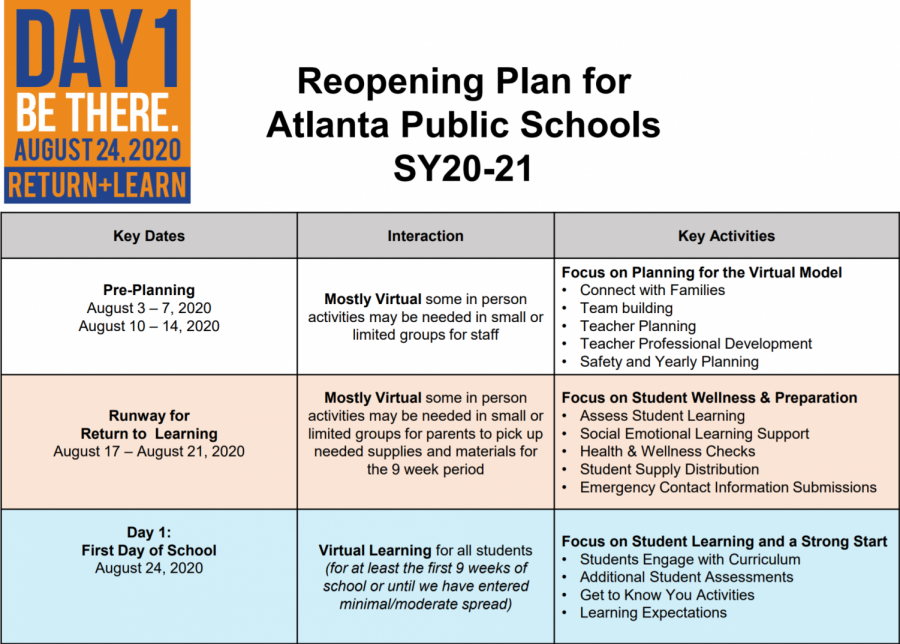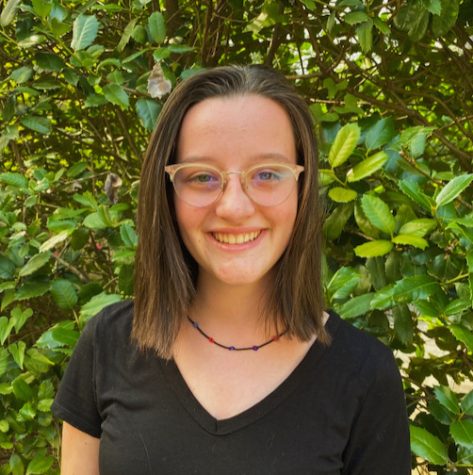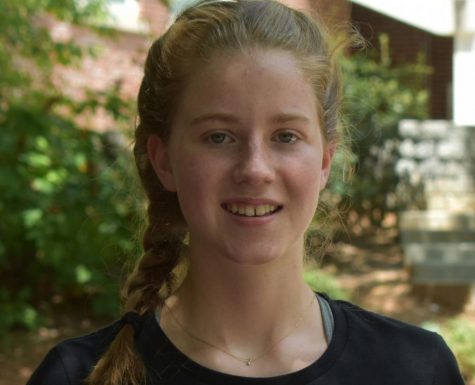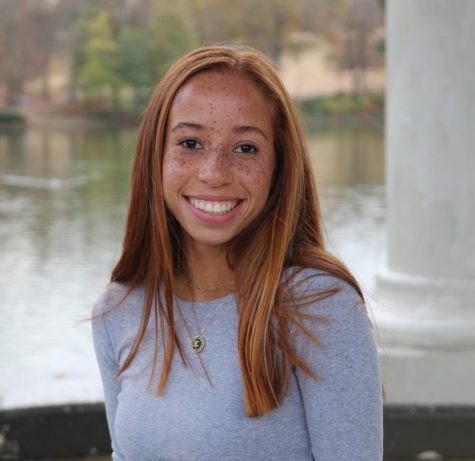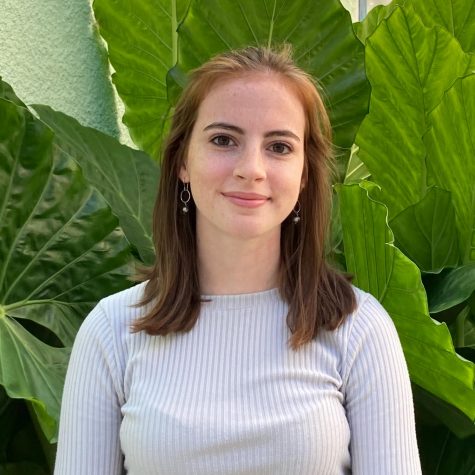Community reacts to the district’s proposal for school re-opening
A chart created by Atlanta Public Schools outlines the proposed plan for the re-opening of schools across the district. The proposal pushes the original first day of school for students back two weeks to allow teachers and faculty time to prepare for the virtual start to the school year.
July 11, 2020
Atlanta Public Schools Superintendent Dr. Lisa Herring proposed a two week delay to the beginning of the 2020-21 school year and nine weeks of virtual learning in response to local, state and national health statistics. The reopening plan is subject to a vote by the Atlanta Board of Education on Monday, July 13.
A survey found that 72 percent of teachers were at least somewhat uncomfortable about returning to work. Teacher Mario Herrera is assuaged by the proposition, which provides that teachers work remotely.
“Overall, I think they made the right call,” said Herrera. “I breathed a sigh of relief.”
This is the first major decision that Superintendent Herring has made, and many teachers are supportive of her proposal.
“I am immediately struck and impressed with the new superintendent,” AP US History teacher Roderick Pope said. “To have come in here like she did as quickly and make this decision, and I think she did it well.”
The proposed delay to the virtual learning format sets instruction to begin on August 24th rather than the 10th, as originally planned, and reduces the duration of the school year by ten days. The decision to move the first day of school back two weeks was made to provide preparation time for teachers and faculty.
“Learning from going through this in the spring when we had to shift our whole focus…over a long weekend, I think everybody realized… that’s just a really short time to do a major shift like that,” AP American Literature teacher Susan Barber said. “I think when people are considering what to do for the fall…we definitely need more prep time so it’s not as chaotic as it was in the spring.”
Parents who were worried about the possible health risks of in person education are comforted by the extra precautions the district is taking.
“I was relieved to hear about the virtual nature of the first nine weeks of school,” Tiffany Wilson, parent of rising freshmen Alden Karp and rising senior Olivia Karp said. “There is so much we do not know about this virus and Atlanta is a high-risk area right now.”
Rising freshmen will spend their first quarter of high school learning virtually, missing out on the social acclimation to high school that other classes had the benefit of participating in. However, parents like Wilson remain hopeful that their students will find ways to connect to the Grady community.
“The transition from middle school to high school can be stressful in person, and I cannot imagine what it will be like in a virtual environment,” Wilson said. “However, our teenagers have grown up in an age of technology that we never knew and they will adapt. I look forward to a vaccine and a sense of normalcy when we can double down on interpersonal skills.”
Wilson’s son Alden Karp, however, has a different take on the virtual transition. Karp feels that he, personally, does not have a disadvantage in the transition to high school. Karp says that he only worries about the overall quality of education while learning online.
“I’m not worried about the first nine weeks, but I feel like it’s going to be really awkward to go back to school and it will be winter and I won’t really know any of my teachers,” Karp said. “I don’t feel disadvantaged. I mean I have a pretty good situation as far as learning electronically, but I know a lot of other kids don’t. So, I know the first nine weeks are going to be a lot harder for other students, especially with food stability and stuff like that.”
Equity is also an area of concern among teachers. From an academic perspective, AP Physics teacher Jillian Breen voices concern about making sure that materials are accessible for hands-on science labs at home. Herrera worries about families where parents have lost their jobs or can’t work from home. He hopes that policies will be tailored to best fit those in need.
“Grady is a unique school,” Herrera said. “It’s a phenomenally supportive community that always steps up. That’s not true of every school. I don’t want cookie cutter policies, and I’m afraid that’s what we are going to have.”
Rising senior Rylan Neal worries that the lack of an in-person relationship with new teachers will make these first nine weeks tough.
“I feel like it will definitely be hard to build relationships with our teachers since we can’t meet them in person,” Neal said. “I guess I am a little bit disappointed that we won’t have the same interactions with our teachers.”
This worry is shared by teachers too.
“My biggest concern as a teacher when I think about starting virtually is how I’m going to create community and rapport with students, how I’m going to set the tone and atmosphere that I like to have in my class,” AP American Literature teacher Susan Barber said.
Teacher Mario Herrera is not only thinking about initial student-teacher connections, but also how teachers will provide emotional support to students in need of it.
“That kind of thing is almost impossible to do in a virtual environment,” Herrera said. “Those personal connections are really, really important and trying to find a way to get it done successfully is probably going to be a priority of every single teacher.”
Not only do teachers have their students to think about, but many have kids at home. AP Physics teacher, Jillian Breen, has two young kids at home.
“From the health side, it makes me feel more comfortable that the district is looking out for us and trying to take care of us,” Breen said. “On the other side, that’s another challenge for me to try to figure out … how to make that balance work; where do we give the time to [students] and make sure that our families get what they need too?”
Linda Brenner has both a rising senior, Josh Brenner, and a rising freshman, Max Brenner. She acknowledges that nine weeks of virtual learning is the “lesser of many bad options,” but is confident in Grady’s ability to adapt the curriculum.
“Now that we know the plan, parents and schools can work together to continue to improve on last year’s learning experience and determine ways that we can create opportunities for our kids to socialize and be together safely,” Brenner said. “I have total confidence in Grady High School’s administration and teaching staff to do a great job with virtual learning in the fall.”
After the release of the proposal, teachers started strategizing for the upcoming school year. AP US History teacher Roderick Pope immediately began to brainstorm how his class will function next year. He is considering a balance between activities where students work at the same time and where students have the ability to work at different times and recognizes the need to adapt to the needs of students.
“It’s got to be what’s best for students because what is right for [one] might not be right for someone else,” Pope said. “More than ever, I feel that as the teacher, I have to create individualized plans for the different groups of students that I teach.”
Barber’s approach is to use virtual learning as an opportunity to innovate.
“One of the things I don’t want to do is try to take the physical classroom and replicate it virtually,” Barber said. “We are going to be virtual, it’s a whole different platform, so how can I lean into that and take advantage?”
Some parents are choosing to look on the bright side and trust that their kids will learn valuable lessons from these unique circumstances.
“We can speculate on the long-term impact of the emotional and educational development of our children, but we know resilience will be a life lesson learned through this experience,” Wilson said.
Teachers also remain optimistic about adapting to the new learning environment and getting through this unprecedented time.
“It’s going to be what it’s going to be, and we all have to be patient with one another and know that we are all in this together,” Pope said. “We’re going to see it through.”

